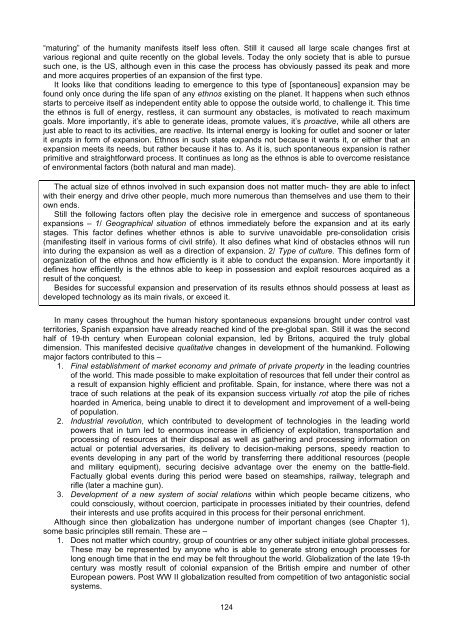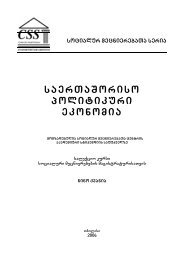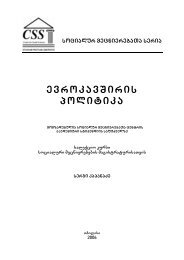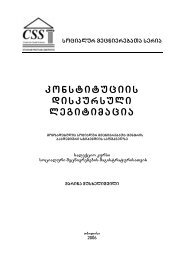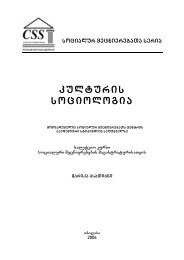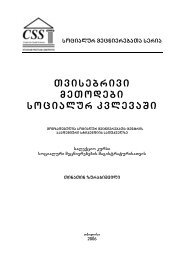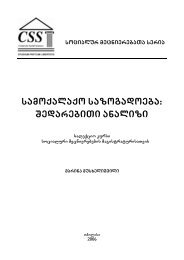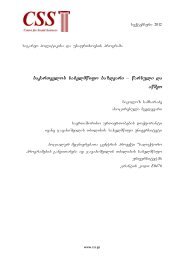“maturing” of the humanity manifests itself less often. Still it caused all large scale changes first atvarious regional and quite recently on the global levels. Today the only society that is able to pursuesuch one, is the US, although even in this case the process has obviously passed its peak and moreand more acquires properties of an expansion of the first type.It looks like that conditions leading to emergence to this type of [spontaneous] expansion may befound only once during the life span of any ethnos existing on the planet. It happens when such ethnosstarts to perceive itself as independent entity able to oppose the outside world, to challenge it. This timethe ethnos is full of energy, restless, it can surmount any obstacles, is motivated to reach maximumgoals. More importantly, it’s able to generate ideas, promote values, it’s proactive, while all others arejust able to react to its activities, are reactive. Its internal energy is looking <strong>for</strong> outlet and sooner or laterit erupts in <strong>for</strong>m of expansion. Ethnos in such state expands not because it wants it, or either that anexpansion meets its needs, but rather because it has to. As it is, such spontaneous expansion is ratherprimitive and straight<strong>for</strong>ward process. It continues as long as the ethnos is able to overcome resistanceof environmental factors (both natural and man made).The actual size of ethnos involved in such expansion does not matter much- they are able to infectwith their energy and drive other people, much more numerous than themselves and use them to theirown ends.Still the following factors often play the decisive role in emergence and success of spontaneousexpansions – 1/ Geographical situation of ethnos immediately be<strong>for</strong>e the expansion and at its earlystages. This factor defines whether ethnos is able to survive unavoidable pre-consolidation crisis(manifesting itself in various <strong>for</strong>ms of civil strife). It also defines what kind of obstacles ethnos will runinto during the expansion as well as a direction of expansion. 2/ Type of culture. This defines <strong>for</strong>m o<strong>for</strong>ganization of the ethnos and how efficiently is it able to conduct the expansion. More importantly itdefines how efficiently is the ethnos able to keep in possession and exploit resources acquired as aresult of the conquest.Besides <strong>for</strong> successful expansion and preservation of its results ethnos should possess at least asdeveloped technology as its main rivals, or exceed it.In many cases throughout the human history spontaneous expansions brought under control vastterritories, Spanish expansion have already reached kind of the pre-global span. Still it was the secondhalf of 19-th century when European colonial expansion, led by Britons, acquired the truly globaldimension. This manifested decisive qualitative changes in development of the humankind. Followingmajor factors contributed to this –1. Final establishment of market economy and primate of private property in the leading countriesof the world. This made possible to make exploitation of resources that fell under their control asa result of expansion highly efficient and profitable. Spain, <strong>for</strong> instance, where there was not atrace of such relations at the peak of its expansion success virtually rot atop the pile of richeshoarded in America, being unable to direct it to development and improvement of a well-beingof population.2. Industrial revolution, which contributed to development of technologies in the leading worldpowers that in turn led to enormous increase in efficiency of exploitation, transportation andprocessing of resources at their disposal as well as gathering and processing in<strong>for</strong>mation onactual or potential adversaries, its delivery to decision-making persons, speedy reaction toevents developing in any part of the world by transferring there additional resources (peopleand military equipment), securing decisive advantage over the enemy on the battle-field.Factually global events during this period were based on steamships, railway, telegraph andrifle (later a machine gun).3. Development of a new system of social relations within which people became citizens, whocould consciously, without coercion, participate in processes initiated by their countries, defendtheir interests and use profits acquired in this process <strong>for</strong> their personal enrichment.Although since then globalization has undergone number of important changes (see Chapter 1),some basic principles still remain. These are –1. Does not matter which country, group of countries or any other subject initiate global processes.These may be represented by anyone who is able to generate strong enough processes <strong>for</strong>long enough time that in the end may be felt throughout the world. Globalization of the late 19-thcentury was mostly result of colonial expansion of the British empire and number of otherEuropean powers. Post WW II globalization resulted from competition of two antagonistic socialsystems.124
2. Does not matter in what sphere of activity (political, economic, cultural, etc.), when and whereare globalization processes initiated as long as they work.3. Anyone (this being country, organization or person) able to initiate global processes is acting inits (his, her) own interests. Factually globalization may also be described as the globalmanifestation of local processes.Virtually no process that in the end leads to changes on theglobal level is deliberately designed and implemented as such (this being hardly possible).Besides the current stage of globalization also led to emergence of some typical features, such as –a/ All processes within the globalization framework are open and two-way. There is a feedback betweeninitiators of globalization and its objects. I.e. any initiative inevitably comes back to its initiator one or theother way. This reverse motion may on principle be as strong or even exceed the initial action. Anyinitiative being spread throughout the world is inevitably being altered, distorted. In the end it may evenbecome the opposite of what it was initially. b/ Any country in the world may make the decision aboutjoining globalization processes. Although on practice quite often this choice is voluntary-coercive as thiswas brilliantly coined back in the USSR. Terms and conditions of such joining are quite well known,although not properly <strong>for</strong>malized as such. In the end these terms and conditions boil down todevelopment of market economy, creation of competitive markets, opening borders <strong>for</strong> free flow ofgoods and capitals and unrestricted access of transnational corporations into domestic markets of theaffected countries. b/ Windows of opportunities to join globalization processes are being created <strong>for</strong>virtually any country of the world (<strong>for</strong> some - more than once) that any can use to join ranks of theleading world powers (although so far only very few actually succeeded). The competitive advantage ofthese leading powers over the rest of the world is so huge that so far they did not shy the emergence ofnew competing powers. c/ Globalization processes are selective. They may possibly affect only someselect, infinitesimal (although important) spots of Earth and simultaneously leave outside their spheresof influence not only parts of countries, whole countries, but whole regions as well. If globalizationaffects such places at all this happens because it’s hardly possible to control large processes and partof in<strong>for</strong>mation or material flows inevitably “escapes” the main stream. d/ Both <strong>for</strong>mal and factualresponsibility of the leading world powers over processes that take place on the planet (including theprocesses they initiate themselves) is relatively low. They are factually able to turn their backs to suchprocesses and events that do not directly fall into their spheres of interests. Even if such processes arevery important locally (leading <strong>for</strong> instance to wars, civil strife, genocide and like) these powers are stillable to restrict themselves to much ado and imitation of mitigating activities.Fact that the US and its closest allies play today the decisive role in establishment of global relationsand initiation of global processes does not mean that globalization is result of some plot by thesecountries, as many imply. Simply at the modern development stage these countries represent the mostactive agents of globalization and in turn are the most intensively influenced by it. Plenty of other ethnosor countries played the similar role of such development agents throughout the human history. As timepasses one stage of development is replaced by the other and they inevitably yield their positions toothers, more active and purposeful players.Besides globalization, as it is, as any natural (in this case – quasi-natural) process is absolutelyneutral towards objects of its influence. What kind of impact it actually makes on any given ethnos orcountry depends in the end on their ability to learn to apprehend this phenomenon and use it <strong>for</strong> theirown end. Also one should not overestimate the role of conscious human will in inception anddevelopment of processes on the global scale. Concise human will may lead to decision, which in turnleads to some concrete action. Whether this action will lead to changes on the global scale hardlydepends on a will of its inceptors. Has not that being so, one might watch development of processaccording to the “Deutchland Uber Alles” scenario, which Thanks God is impossible.Today there is just one global factor that unites all people disregarding their level of development ortype of civilization. This factor is – fear. The only thing that can today bring all the mankind within thesingle global system is existence of weapons of mass destruction that are potentially able to destroy thelife on the planet. As such this system has developed sometimes between August of 1945 and October1957 – i.e. when the US used nuclear bombs against Japan and when the USSR by launching firstearth satellite proved that there was not any place on the planet left outside the reach of nuclear arms.Case-Study 1 – Two <strong>Social</strong> Systems – is Competition Still Going On?It looks like that the modern Western social science recognizes just one social system known as125
- Page 1 and 2:
socialur mecnierebaTa seriamsofliop
- Page 3:
s a r C e v iSesavali .............
- Page 6 and 7:
situaciis arseboba, Tavis mxriv, am
- Page 8 and 9:
globalizacia — ori antagonisturi
- Page 10:
(informacia), vidre ramdenime aTeul
- Page 13 and 14:
TanamSromlobas. faqtiurad SesaZlebe
- Page 15 and 16:
1.3. msoflio politikis Teoriebi1.3.
- Page 17 and 18:
TanamSromlobaze uaris Tqma sul ufro
- Page 19 and 20:
danarCeni msofliosagan gansxvavebiT
- Page 21 and 22:
meqanizmebi ubralod ar arsebobs;•
- Page 23 and 24:
idga zemoT daxasiaTebul “piramidu
- Page 25 and 26:
amocanebis gadasaWrelad. 37es ar ni
- Page 27 and 28:
dacema, pirvel rigSi, materialuri d
- Page 29 and 30:
ealurad globaluri iyo. isini, isevd
- Page 31 and 32:
mSeneblobis procesSi klasobrivi brZ
- Page 33 and 34:
dolaris daxmareba miiRo.sainteresoa
- Page 35 and 36:
sistemas da gamoiwvia britaneTis im
- Page 37 and 38:
miekuTvneboda (ix. danarTi 3.1 da 3
- Page 39 and 40:
TiTqmis mTlianad ugulvebelyos is pr
- Page 41 and 42:
2.2.5. meore globalizaciis dros gag
- Page 43 and 44:
gakeTeba (iaponia). meore mxriv, er
- Page 45 and 46:
ac saboloo jamSi qmnis sistemis des
- Page 47 and 48:
laparakia imaze, rom romelime calke
- Page 49 and 50:
mmarTvelobis principebis adaptacia
- Page 51 and 52:
matareblebi arian. ukve es faqti aq
- Page 53 and 54:
warmoadgens nebismieri warmatebuli
- Page 55 and 56:
koloradosa da vaiomingis nawilebi.
- Page 57 and 58:
xSirad faqtiurad kulturuli misioner
- Page 59 and 60:
dasawyisSi oficialurad TviT aSS-ma
- Page 61 and 62:
mosaxleobis 20%, romelic yvelaze md
- Page 63 and 64:
sruli liberalizaciis Sesaxeb faqtiu
- Page 65 and 66:
gansxvavebebi, ganpirobebuli maTi e
- Page 67 and 68:
urTierTobaSi.3.4. zemoT aRwerili pr
- Page 69 and 70:
evri qveynisaTvis zemoT aRwerili ti
- Page 71 and 72:
aSS saerTaSoriso daxmarebis naxevar
- Page 73 and 74: aSkarad sWarbobs evrogerTianebis ne
- Page 79 and 80: meore — Tanamedrove sabrZolo saSu
- Page 81 and 82: SeuZliaT, an ar awyobT efeqturi Ron
- Page 83 and 84: amoiwura.cnobili ebraeli moRvawe,
- Page 85 and 86: masze agebuli civilizaciis sistemur
- Page 87 and 88: eJimi mravali wlis manZilze xels uw
- Page 89 and 90: mxolod SedarebiT mcire nawils Seexo
- Page 91 and 92: daavadebebiT. am konfliqtSi monawil
- Page 93 and 94: naxevar saukunes moiTvlis. principS
- Page 95 and 96: kontrols eqvemdebareba.rac Seexeba
- Page 97 and 98: • faqtiurad nebismieri gadawyveti
- Page 99 and 100: 4.2.3. globalur doneze aseTi tipis
- Page 101 and 102: krizisebisagan, rom rodesac bazari
- Page 103 and 104: sabWoTa kavSirma gamomdinare nawilo
- Page 105 and 106: usafrTxoebis erT-erTi ZiriTadi elem
- Page 107 and 108: Microsoft-is top-menejerebs). sadac
- Page 109 and 110: veb-gverdebs; xolo Google-m 2006 we
- Page 111 and 112: saxiT, amerikis moqmedeba SedarebiT
- Page 113 and 114: organizaciebis da a.S.amave dros, r
- Page 115 and 116: 2 termini globaluri mainc uamravi s
- Page 117 and 118: 61 ssrk-s SemTxvevaSi etyoba misi g
- Page 119 and 120: 30-jer naklebia, vidre saavtomobilo
- Page 121 and 122: SesaZlebelia faqtiurad nebismieri s
- Page 123: however powerful, can become transn
- Page 127 and 128: system, which leads to restoration
- Page 129 and 130: On the other hand, in the late 19 t
- Page 131 and 132: traceable here, technological compo
- Page 133 and 134: extremist than terrorists themselve
- Page 135 and 136: human rights is routine. 24The situ
- Page 137 and 138: Transformation of Islam, as the rel
- Page 139 and 140: countries, where the government and
- Page 141 and 142: Of course if the developed world ma
- Page 143 and 144: (including affiliated agencies and
- Page 145 and 146: including legal acts, represents re
- Page 147 and 148: passed by its more successful prede
- Page 149 and 150: principle should possess some cultu
- Page 151 and 152: coherent and purposeful than before


